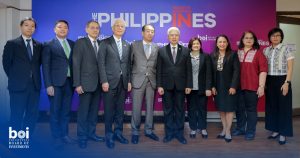
Davao City—Nearly 200 industry stakeholders across Mindanao gathered in Davao City for the Tatak Pinoy Act (TPA) Regional Forum, organized by the Department of Trade and Industry (DTI) last 28 August 2024.
The two-day event aimed to address critical challenges and outline strategies for enhancing productivity and competitiveness across various industries under Republic Act No. 11981, also known as the Tatak Pinoy Act.
In her keynote address, DTI Chief of Staff Blesila Lantayona highlighted the importance of the TPA in driving the country’s economic complexity by promoting higher-quality, more complex products and services.
She emphasized that the law would uplift local industries, create high-paying jobs, and strengthen the Philippines’ position in the global market. “By identifying the challenges and tapping into regional strengths, we can significantly enhance the global competitiveness of our industries,” Chief of Staff Lantayona said.
Throughout the forum—stakeholders from the cacao, palm oil, coffee, coconut, information and communications technology (ICT), and creative industries—participated in breakout sessions to discuss their respective challenges and propose solutions.
The cacao industry identified insufficient raw material supply, a preference for international buyers, and a need for entrepreneurial development among farmers as major obstacles. Participants proposed establishing a consolidation system and creating a Mindanao Cacao brand to address these issues.
In the palm oil industry, high logistics costs and limited technology adoption were cited as significant concerns. Stakeholders suggested promoting local fertilizer production and enhancing farmer capacity through training programs.
Meanwhile, the coffee industry is faced with low productivity, capital shortages, and intense competition from international products. Participants proposed creating a Coffee Excellence Center and leveraging technology to improve coffee plantation management.
The coconut industry, on the other hand, deals with aging coconut trees and a lack of manufacturing facilities. To resolve these, stakeholders called for government intervention to support infrastructure development and boost productivity.
In the ICT sector, infrastructure connectivity gaps, lack of awareness and resistance to digitalization were cited as critical issues. Recommendations included fostering private sector collaboration and providing targeted funding to bridge the skills gap and encourage innovation.
The creative industries struggle with a lack of funding and skills gaps. Participants recommended allocating funds under the Malikhaing Pinoy and Tatak Pinoy programs and establishing a creative industry database alongside incentive policies.
The first day of the forum began with Assistant Secretary Leonila Baluyut providing an overview of the Tatak Pinoy Act and its importance in driving economic growth. World Bank Lead Economist Gonzalo Varela then shared insights into global industrial policies and how the Philippines can adopt best practices to strengthen its local industries. The day concluded with a panel discussion featuring key industry leaders from the cacao, coffee, and agriculture sectors, who discussed opportunities for growth in their respective industries.
On the second day, participants engaged in industry consultation workshops, where they developed strategies to address the challenges identified during the first day. These sessions facilitated collaboration among stakeholders to draft actionable solutions, which will be crucial in the national implementation of the Tatak Pinoy Act.
DTI-Region XI Regional Director Romeo L. Castañaga commended the stakeholders for their active participation, noting that their inputs would help tailor the Tatak Pinoy Strategy (TPS) to the unique needs of the region. “The feedback we gathered will guide us in creating more responsive policies that align with industry realities,” Castañaga said.
DTI Acting Assistant Regional Director Atty. Lucky Siegfred M. Balleque, in his closing remarks, expressed optimism about the collaboration between the government and industry stakeholders. “The success of this forum shows the importance of cooperation in driving economic growth and ensuring global competitiveness for Philippine industries,” he remarked.
The Davao Forum is part of a series of regional consultations under the Tatak Pinoy Act, which seeks to boost the competitiveness of local industries and create a more inclusive economic future for the Philippines. ♦
Date of release: 20 September 2024










